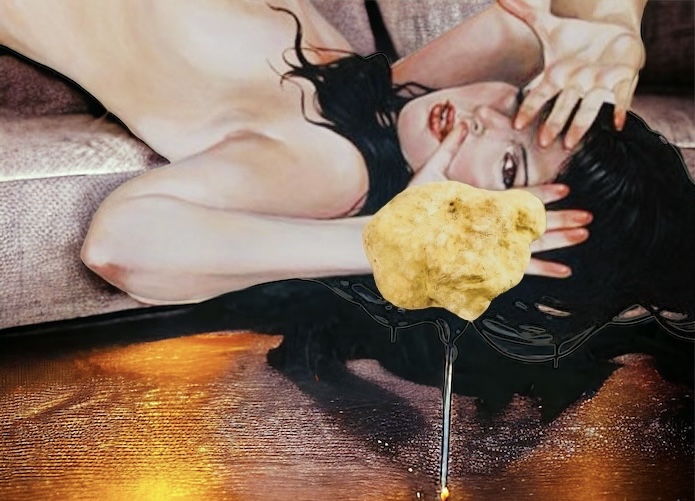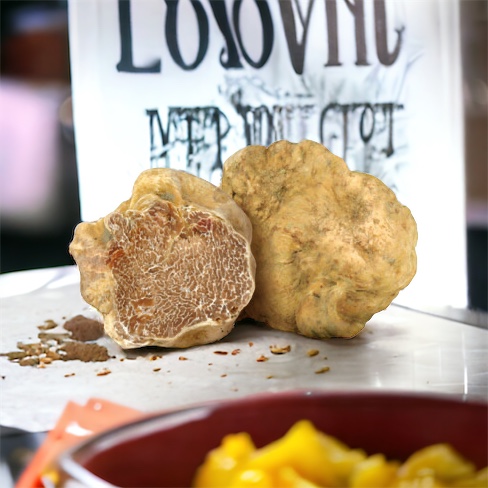Editorial
EROS AND TRUFFLES
on 20 September 2024

A correlation as old as it is discussed.
An introductory chapter to discover a fascinating combination.
The idea that food has something magical in it may seem absurd in today’s world. But to what extent can we trust a materialistic culture that has led to the indiscriminate exploitation of the earth, creating environmental disasters that are now irreparable? One would be inclined to say that Mother Nature has rebelled against her distorted children, if we did not know that nature is not a sentient being, nor even a deity. However, it is curious to observe how many, today, almost with a sense of regret reflect on the now distant era when Nature was enveloped in an aura of sacredness and food was perceived as a gift, albeit one derived from human labour. Faced with the progressive reduction of arable land due partly to desertification, partly to the advance of mega-cities and industrial centres, a growing number of people, in every part of the world, not only feel the need to respect nature for the survival of the human species, but even perceive the existential, if not spiritual, need to restore a sacred value to nature and food.
Loving food
The idea that food is much more than a commodity, but rather a cultural product in which religious traditions and feelings, aesthetics, cognitive and so on, are combined.
Food magic’ – but what exactly does that mean? Certainly one cannot give this term the sense that magic was once given, i.e. the ability to dominate the forces of nature evoked through particular rituals. Nor is it to be understood, food wizardry, as a power derived by humans from taking magic potions, like Alice in Wonderland or Popeye (aka Popeye).
However, we know that every food possesses in itself various ‘powers’, in orimis a nutritional power indispensable for survival. Human food is the foundation of culture and feeling. If you want to make people better, instead of rants against sin, give them better food.
Food should not only be considered as food for the body, mind and spirit. Food possesses a real cultural power corresponding to the beliefs, not only religious, that have settled on it over the millennia distinguishing between sacred and impure foods, identifying food rituals from their initial preparation to their consumption, and so on.
We know that since time immemorial these underground mushrooms have been prized for their special flavour, thanks to which they have become a ‘condiment’ that perfects numerous dishes.
In addition to flavour, there is more: an established tradition extols truffles for their aphrodisiac properties . This tradition, which some would call superstition, was handed down by various Renaissance physicians and then became commonplace thanks to numerous literati. True, these properties are questioned by modern science, then reconfirmed by some researchers. In short, thanks to this swing of opinion, the link between eros and truffles has been further strengthened.

Loving food
Indeed, anthropologists admit that, like many other foods, truffles retain a mysterious aura stemming from their very nature: they are ‘wild’ (like sex) in that they grow underground but cannot be cultivated. The search itself has something ‘magical’ about it: it takes place in places far from the inhabited centre and makes use of knowledge that has never been written down; it is an immaterial knowledge that reinforces another immaterial power, which is that of scent.
The aroma of truffles can be intoxicating for some or disgusting for others, in any case it provokes strong emotional reactions. That scent is even capable, on certain occasions, of altering one’s vision and arousing fantasies of various kinds to the point of becoming a metaphor for sexual desires: earth testicle, seductive potato, fetish tuber, odorous truffle… It is spontaneous to establish a parallelism between the use of perfumes in magic-religious rituals and the use of truffles in gastronomic rituals, understood both as a moment of collective participation and as an intimate moment of a couple.
In both cases, it is the perfume that marks the celebration of the rituals, which begins with astonishment, admiration, joy, and excitement at the arrival of the blessed hypogean mushroom on the table, and arrives at an intimate pleasure corresponding to the expectations of the individual participants, an enjoyment that naturally differs from subject to subject but which is nonetheless a form of amorous emphasis, a divine invasion of the Bacchic-Dionysian rites.
Taken from ‘Eros and Tartufi’ Giordano Berti
